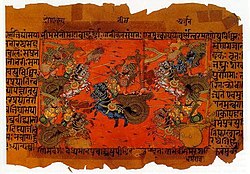References
- ↑ Viśvanātha Cakravartī (2004). Sārārtha Darśini: Tenth Canto Commnetaries [of] Srimad Bhagavatam. Mahanidhi Swami.
- ↑ Tales From the Mahabharat, pp31, By B.K. Chaturvedi, Published by Diamond Pocket Books (P) Ltd. ISBN 81-288-1228-9, ISBN 978-81-288-1228-6
- ↑ Swami Vijnanananda (2008) [1921]. The S'rimad Devi Bhagawatam. Vol. I. BiblioBazaar, LLC. p. 334. ISBN 978-1-4375-3059-9.
| Traditional author and narrators | |||||||||||||
|---|---|---|---|---|---|---|---|---|---|---|---|---|---|
| Books (parvas) | |||||||||||||
| Kingdoms and Tribes | |||||||||||||
| Major Events | |||||||||||||
| Characters |
| ||||||||||||
| Related | |||||||||||||
Hindu deities and texts | ||
|---|---|---|
| Gods | ||
| Goddesses | ||
| Deity groups | ||
| Texts (list) | ||

